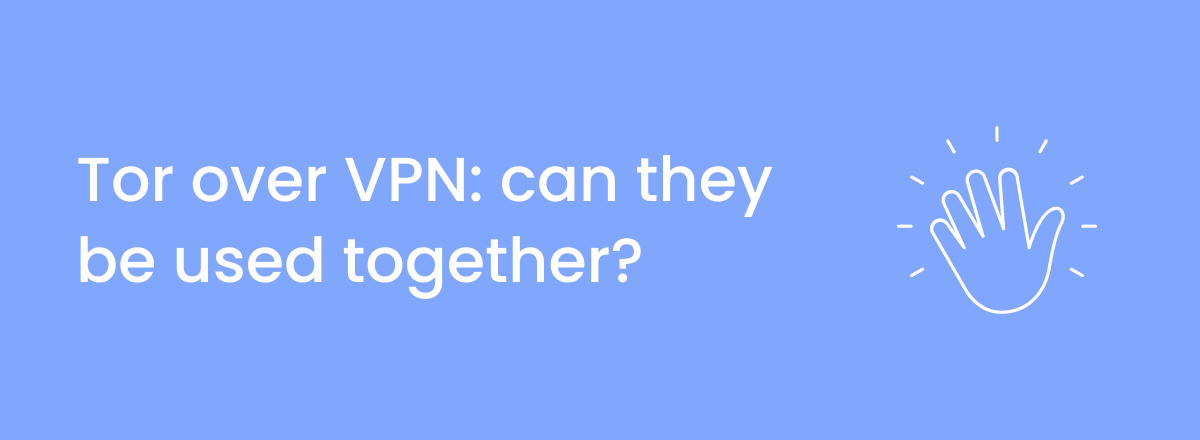VPN and Tor are both excellent tools that keep your online presence safe and secure. Using them together will give you extra protection while you’re browsing the Tor network. Connecting to a VPN and then using Tor is called “Tor over VPN” or “Onion over Tor.”
The benefit of using Tor over VPN is that your Internet traffic will become private and no one will be able to see your actual IP address. All your data will be encrypted and hidden from external parties, and you’ll get access to Tor even if it’s blocked in your region since VPN changes your location.
 How to use Tor with a VPN?
How to use Tor with a VPN?
- Subscribe to a VPN service. NordVPN, now 77% off, has a Tor over VPN feature.
- Connect to any of the servers NordVPN has to offer.
- Download Tor browser and open it.
- Start surfing the web anonymously!
Tor vs VPN: what’s the difference?
Tor and VPNs are tools you can use to protect your online data. They work in different ways, but achieve the same result: increased privacy and anonymity.
What is Tor?
Tor is an open-source software that’s available to everyone for free. It adds layers of protection and anonymity to your online activities by sending your data through random servers, or relays, before taking you to the website you’re accessing.
Your data is encrypted multiple times (which is why Tor is also called “Onion”) by nodes on the Tor network. Only the exit node will know what site you’re accessing since the encryption is stripped by the time your traffic reaches the final node.
This entire process can be slow because it passes through multiple nodes instead of just one server, but the extra protection you get from it makes it worthwhile. Keep in mind that external parties will be able to tell that you’re using Tor.
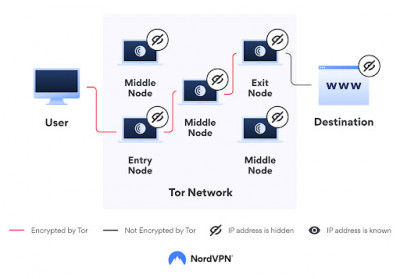
What is VPN?
VPN is what will keep external parties from knowing that you’re using Tor. VPN stands for Virtual Private Network. It reroutes your Internet traffic so it passes through the VPN host’s (NordVPN, for example) servers and masks your IP address so your Internet Service Provider (ISP) and websites can’t collect your data.
VPNs also encrypt your data and they’re a popular way to bypass Internet censorship and access geo-blocked content. Finding the right VPN is important as many VPN services will collect your data and even sell them to advertisers (more common in free VPN services).
How Tor with a VPN works?
Using Tor alone may increase the chances of your data being compromised since it’s a network that’s run by volunteers. The volunteers might not always have good intentions and they could try to steal your data.
That’s why it’s important to connect to a VPN first. Tor over VPN means your data is first encrypted by the VPN service, and then by the Tor application you’re using. All your Internet traffic will go through the VPN server (located in a different region), thereby hiding your actual identity and location.
Your data is passed through a series of random nodes when you use Tor over VPN. With each node, your data gains a new layer of encryption. This makes it virtually impossible for anyone to see the original IP address.
Your data passes through three nodes. The first node is called the entry node, the second one is called the middle node, and the final one is called the exit node.
As your data moves toward the exit node, the layers of encryptions are removed and your data is completely stripped of the encryption layers when it reaches the exit node, making it look as if you’re using Tor from the last node.
VPN will hide your IP address from the first Tor node, which is often targeted by hackers, and prevent your ISP from finding out that you’re connected to Tor. It’ll add additional layers of security to already existing layers when using Tor, making sure no external party gets suspicious and no hacker can steal your data. This is important if you have to deal with sensitive information or you plan to use Tor to access the dark web (also known as .onion sites).
Tor over VPN or VPN over Tor?
Tor over VPN may seem like the standard practice, but you can also use VPN over Tor, I.e, connecting to a VPN after opening Tor. Tor over VPN is generally considered safer, which is why it’s uncommon to hear about VPN over Tor.
VPN over Tor doesn’t hide your IP address, which defeats the purpose of using a VPN, and it’s harder to set it up. With VPN over Tor, your identity is exposed to the entry Tor node, so it’s more vulnerable to attacks and your ISP can still see that you’re using Tor, which, depending on the laws of your region, can get you into trouble.
Tor over VPN, on the other hand, makes you anonymous, ensuring that no one gains access to your data. Only the exit node is unprotected, but the IP address will still be hidden so no one can see you’re using Tor.
Here’s a table that lists some of their differences:
|
Tor over VPN |
VPN over Tor |
|
Easier to set up. |
More complicated for the casual user. |
|
Your ISP can’t know you’re using Tor. |
Your ISP knows you’re using Tor. |
|
IP address is hidden from the entry node. |
Entry node knows your real IP address. |
|
Can’t access sites that have blocked Tor. |
Can access sites that don’t allow Tor traffic. |
Why you should use Tor with a VPN
Here are some benefits of using Tor over VPN:
- IP address is hidden – The biggest advantage of using Onion over VPN is that your IP address is hidden from all nodes. This means no one (except the VPN host) can know you’re using Tor. The entry node will only see the IP address provided by the VPN.
- Your online activity is untraceable – With Tor over VPN, it becomes nearly impossible for anyone to track your online activities. Your Internet traffic will be wrapped in multiple layers of encryption and you’ll be entirely anonymous on the Internet.
- Access to Tor in countries where it’s illegal – Tor is often used to access the dark web, which is a major reason why it’s banned in many countries. You can circumvent this and access the Tor network using Tor over VPN.
- Access to onion sites – Sites ending with .onion can only be found on the dark web. The only way to access them is with a Tor application. Of course if you visit these sites without a VPN, your ISP will know and you might be breaking the law even if the sites aren’t dangerous. With Tor over VPN, you can safely access .onion sites.
What is Onion Over VPN?
The Onion network refers to the .onion sites that are hidden and only accessible through a Tor application. The term Onion is interchangeable with Tor, but the major reason why Tor is often called Onion is because the layers of encryption are stripped away as they pass through the three nodes, like an onion.
Most VPN services have a built-in Onion over VPN feature, which means all you have to do is download the Tor browser and subscribe to the VPN. This built-in feature connects you to a VPN server and then passes your Internet traffic through the Tor network.
NordVPN has a built-in Onion over VPN feature and it’s considered a safe and trustworthy service. It has “Speciality servers” that help you get Onion over VPN connectivity.
Most VPN services are available on multiple platforms so you can download a VPN app on your phone, too.
Subscribe to the VPN service, sign up, enable Onion over VPN, and download the Tor browser. This should be a straight-forward process on both PCs and smartphones. The built-in Onion over VPN connectivity in a VPN service doesn’t require you to tweak any settings at all.
The Tor browser doesn’t require any tweaking, either. Just activate the VPN and start browsing!
Best VPNs with Tor browsing
It’s important to use a VPN that’s considered trustworthy since it’ll have access to your data. You can’t go and try every VPN on the market, but we did some testing for you and found the following 3 to be the best VPN services that have Onion over VPN connectivity:
1. NordVPN
NordVPN has a built-in Onion over VPN feature which means you can easily connect to the Tor network. In fact, you don’t even have to download the Tor browser. Just make sure that you choose OpenVPN (TCP) as the VPN protocol first.
After that, connect to one of its Speciality servers and click on Onion Over VPN. NordVPN will automatically connect you to the fastest server available. Once a connection has been established successfully, you can start using any browser. Tor browser always works best with a VPN as it provides maximum security.
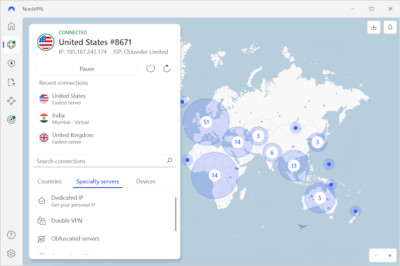
NordVPN is well-renowned for its torrent support, privacy, and speed. It also has an intuitive mobile app with great customer support. NordVPN costs from $3.39/month, which is a decent price for one of the most popular VPNs on the market.
2. ExpressVPN
ExpressVPN is another household name in the VPN industry. It’s considered a safe and trustworthy VPN service.
ExpressVPN has a no-log policy and it’s generally considered the best option for streaming Netflix and accessing geo-blocked content. It doesn’t have a free trial version, so you have no choice but to pay for the subscription, but it does offer a 30-day money back guarantee.
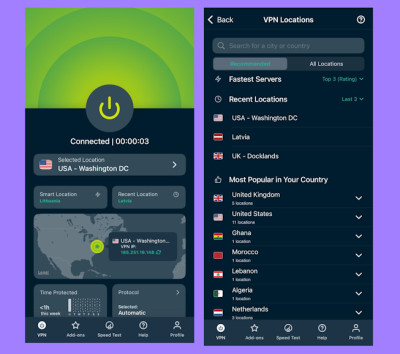
ExpressVPN gives you access to 3,000+ servers in 105 countries at a price from $2.44/month.
3. Proton VPN
Proton VPN is another great VPN service that gives you the maximum amount of privacy you can get. It also has a free version, but we don’t recommend using it. It’s available on all platforms.
Proton VPN has a built-in Onion over VPN feature and accessing Tor network with it is simpler than on NordVPN or ExpressVPN. All you have to do is connect to a server, the same as you would connect to a regular server, in a country that has the Onion symbol next to it. These servers will have “TOR” in their names (HK#20-TOR, for example).
Make sure you connect to a server that’s close to you so you get a good connection speed. After connecting to an Onion server, Proton VPN will pass your traffic through the Tor network and you’ll be able to use the Tor browser with a VPN.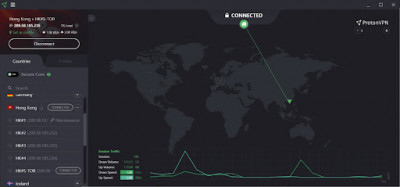
Proton VPN costs from $3.59/month and offers a 30-day money-back guarantee.
Can I use a free VPN with Tor?
A free VPN can be used, but we don’t recommend it as they’re susceptible to attacks and data leaks. Free VPNs are also known to make money by selling their users’ data to advertisers since that’s the only way they can make money.
A premium VPN that offers money-back guarantee is the way to go. NordVPN and ExpressVPN both offer a 30-day money-back guarantee. This means you can try the VPN for a few weeks and get a refund if you don’t like their services.
Free VPNs are bloated with ads, which will slow down your connection, which is frustrating because Tor over VPN is already slow. Using a free VPN also means that you won’t be completely anonymous on the Internet and anonymity is crucial when using the Tor network since it’s illegal in many countries.
You’ll have access to a limited number of servers when using a free VPN and most free VPN services won’t even give you the option to connect to a server of your choice.
We recommend you use a premium VPN if you want to keep your online presence private and secure.
Frequently asked questions
Onion over VPN isn’t entirely safe, but it is safer than using either service on its own. This method can be vulnerable to attacks and surveillance, as Tor itself is not entirely foolproof. Your IP address will be hidden and your data will be encrypted, though, so even if you’re targeted, the chances of your data being stolen are almost none.
No, VPN is better than Onion in several different aspects. It’s faster than Onion because it only goes through one VPN server, whereas Onion passes your data through three different nodes. You’re also more prone to losing your data if you only use Tor since the nodes, run by volunteers, can have malicious intent. This is why we recommend that you use Tor over VPN, which is the safest option.
The use of Tor and VPNs is generally legal, as long as you are accessing content that is not restricted or prohibited by law in your region. You should check with your local laws, though, since Tor and VPN are completely banned in some places. You can circumvent this by using Tor over VPN which will mask your actual location, but it’s still best to be aware of any legal restrictions and ensure that your activities online are within the bounds of the law.


